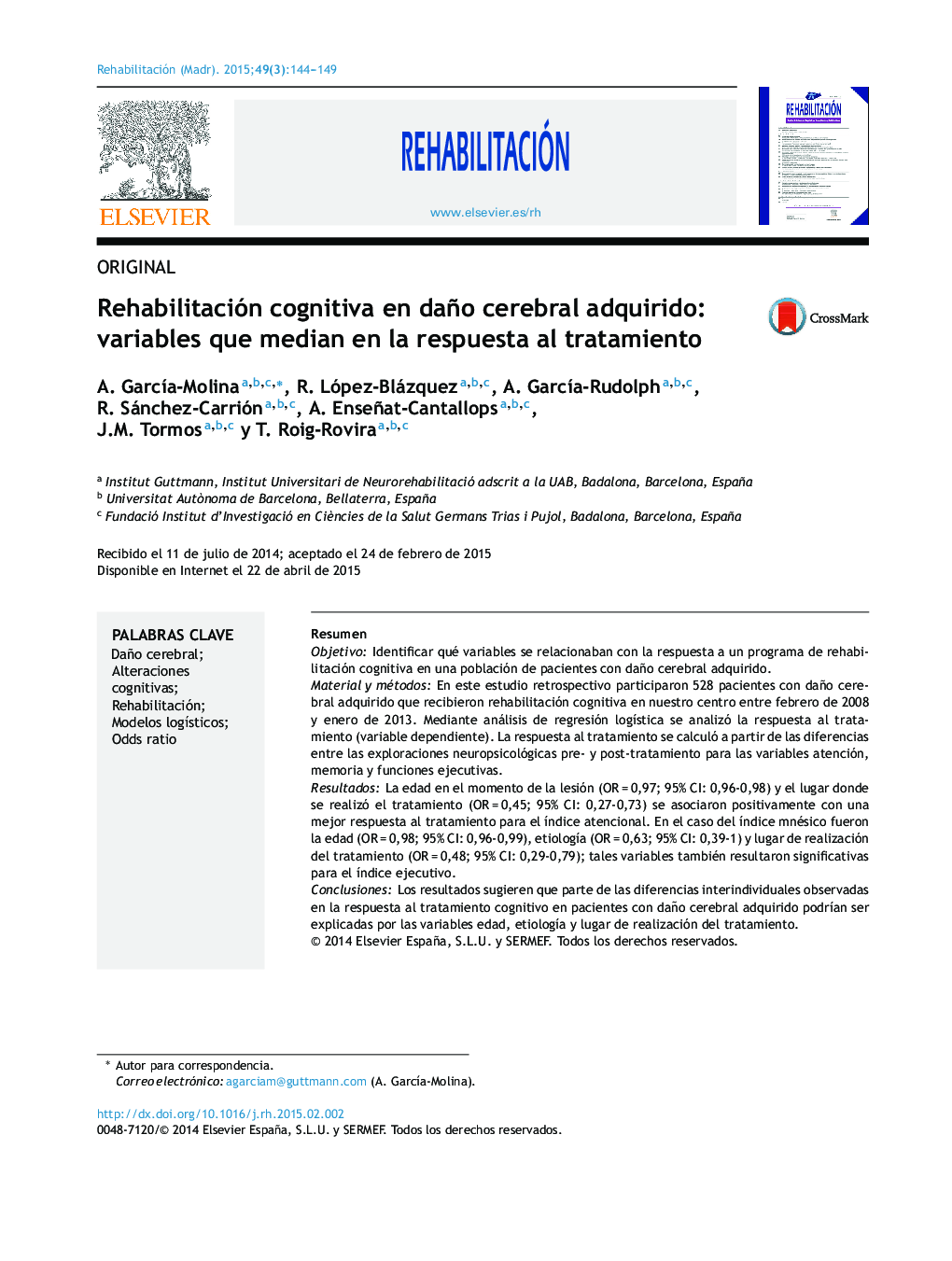| کد مقاله | کد نشریه | سال انتشار | مقاله انگلیسی | نسخه تمام متن |
|---|---|---|---|---|
| 4084747 | 1267807 | 2015 | 6 صفحه PDF | دانلود رایگان |

ResumenObjetivoIdentificar qué variables se relacionaban con la respuesta a un programa de rehabilitación cognitiva en una población de pacientes con daño cerebral adquirido.Material y métodosEn este estudio retrospectivo participaron 528 pacientes con daño cerebral adquirido que recibieron rehabilitación cognitiva en nuestro centro entre febrero de 2008 y enero de 2013. Mediante análisis de regresión logística se analizó la respuesta al tratamiento (variable dependiente). La respuesta al tratamiento se calculó a partir de las diferencias entre las exploraciones neuropsicológicas pre- y post-tratamiento para las variables atención, memoria y funciones ejecutivas.ResultadosLa edad en el momento de la lesión (OR = 0,97; 95% CI: 0,96-0,98) y el lugar donde se realizó el tratamiento (OR = 0,45; 95% CI: 0,27-0,73) se asociaron positivamente con una mejor respuesta al tratamiento para el índice atencional. En el caso del índice mnésico fueron la edad (OR = 0,98; 95% CI: 0,96-0,99), etiología (OR = 0,63; 95% CI: 0,39-1) y lugar de realización del tratamiento (OR = 0,48; 95% CI: 0,29-0,79); tales variables también resultaron significativas para el índice ejecutivo.ConclusionesLos resultados sugieren que parte de las diferencias interindividuales observadas en la respuesta al tratamiento cognitivo en pacientes con daño cerebral adquirido podrían ser explicadas por las variables edad, etiología y lugar de realización del tratamiento.
ObjectiveTo identify the variables related to response to a cognitive rehabilitation program in a population of patients with acquired brain injury.Material and methodsThis retrospective study included 528 patients with acquired brain injury who received cognitive rehabilitation at our center between February 2008 and January 2013. We used logistic regression analysis to examine the impact of predictive variables on treatment response (dependent variable). Differences between pre- and post-treatment neuropsychological assessment were used to calculate treatment response in the domains of attention, memory, and executive function.ResultsFor the attention index, the variables positively associated with better treatment response were age at the time of injury (OR = 0.97, 95% CI: 0.96-0.98) and place of treatment (OR = 0.45, 95% CI: 0.27-0.73). For the memory index, the variables positively associated with better treatment response were age (OR = 0.98, 95% CI: 0.96 to 0.99), etiology (OR = 0.63, 95% CI: 0.39 to 1) and place of treatment (OR = 0.48, 95% CI: 0.29 to 0.79); these variables were also significant for the executive index.ConclusionsThese findings suggest that part of the inter-individual differences in response to cognitive rehabilitation in patients with acquired brain injury could be explained by age, etiology and place of treatment.
Journal: Rehabilitación - Volume 49, Issue 3, July–September 2015, Pages 144–149